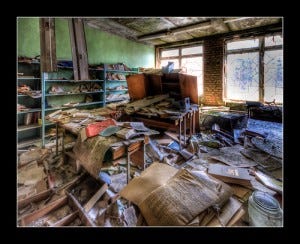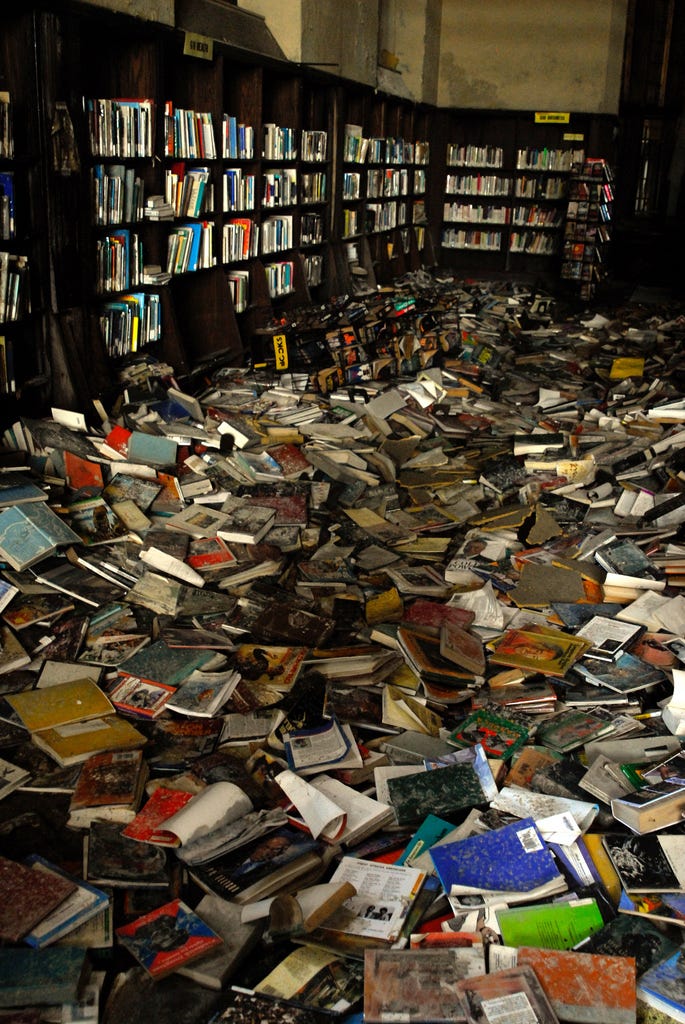And the books lie in mouldering heaps

School library in the ghost town of Pripyat
I was noodling around on the net and ran across a book last night. As I downloaded it, because it's a Project Gutenburg book (free!), looks interesting, and I might read it, something occurred to me. We keep hearing that the book as a form of entertainment is dying. I know people who proudly proclaim that the only way to read is by holding a hunk of paper pulp in your hands and paging slowly through it. They are clinging to the past, to happier memories of bygone times. Change is hard, and humans resist it kicking, screaming, clawing and biting as they are dragged by their scruff into the future.
I'm not, actually, saying that paper books are dead. Nor am I saying that I will disavow paper books. There is something about cracking open a box of my own books, that new-book smell... which is very different from the old book smell you can find in the right kind of bookstores. I love that one, too, and will seek it out. I am saying that when Gutenberg first put his press into motion, the scribbling monks all over the world cried out in protest. And later, when the Industrial Revolution progressed to the point of mass printings, the hoi polloi (because there is nothing more snobbish than the mob) lifted their collective noses and proclaimed the pulp novels trash, and injurious to the weak of mind.
And yet... I was able to click and obtain one of those pulp novels last night. It wasn't the last time I'll do it, either. Books that were forgotten before I was born, are coming back to light. This would never have been made possible if it weren't for the Age of the Electron, and for the boundless appetite humanity has for stories. We'll take them all, the good, the bad, and the indifferent, they are all literature. Books lie mouldering in heaps in what were public libraries, but there is hope!

A ruined Detroit library.
The paper shells of the books may lie in ruins, but their souls live on in the electrons streaming the web. If you plunge into the archives of the books at Project Gutenberg, you will shortly be impressed of several things. One, for me, is how many books there are. So. Many. Books. More than even I could read in my salad days when I would consume several in a sitting, let alone a day. Once, I was limited to what I could carry. Now, I'm limited by the time I have to devote to reading. The other thing I realized when I'd found PG (and before it, the online library at UPenn) was how awful some of the old books were.
Now, in literature I break books into three broad categories. The good, the bad, and the damning-with-faint praise indifferent. The first two, you'll remember after reading them. You might not enjoy the memory of the bad, but it's seared into your mind. For me, that means certain authors I just don't read. One, sadly, I loved, but one book changed that. Ah, well. It's not that there aren't plenty other books to read!
No, as an author the worst thing I can think of is for my books to be condemned to mouldering in the ranks of the indifferent. The books you put down, and forget you ever read. I know for me, I've read so much, so fast, that I am always finding books I didn't realize I'd read before. Even in the lists of authors I know I like, I still run into that. Usually, I get a certain sense of deja vu once I'm into the first chapter, and realize what I've done. Sometimes it takes me longer to cue into it. I sometimes regret this absent-mindedness. I have stories I can remember bits of, or even the entire plot, but I neglected to pay attention to who the author was, or even the title of the story. I used to read the Year's Best anthologies of SF, when I could find them in the library or a used bookstore. Most of them older than I was, or even my mother. But that was where I learned to love the short story, and science fiction. Now? I can call up the story, but the details have gone.
Paper books can die in a fire - we were looking at photos in my evidence collection class, of arson cases. In two of them were sadly blackened bookshelves, mute victims of the heat and smoke. There is something unutterably sad about seeing destroyed books. Wet, the enemy of paper pulp, is another one that will subtly creep into the pages and leave them foxed with mold. I have reluctantly put books back on the shelf after flipping them open to see the fatal stains of their demise amid a faint puff of spores.

We all dream of a library like this one, warm, a sanctuary...
Few of us have the room for a library like the John Work Garrett Library. Or the money for the upkeep of such a thing. We can, however, fit all of the 30,000 volumes it boasts into our home computer, and then carry several hundred at a time in our bag when we go out. We have the book with us always, even when the paper is too brittle and brown to turn over. The worlds the authors created, from hundreds of years ago to right-now-she's-writing dream on, waiting only for a reader's mind to waken them and bring them back to life. Change is inevitable. Losing the past is not.




